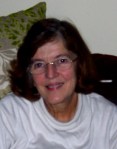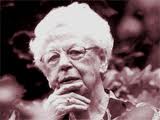 The following is a guest post written by Mary Grey, Ph.D., Professor of Feminist Theology at St. Mary’s University College, in Twickenham, London, and author of thirteen books including A Cry for Dignity: Religion, Violence, and the Struggle of the Dalit Women in India.
The following is a guest post written by Mary Grey, Ph.D., Professor of Feminist Theology at St. Mary’s University College, in Twickenham, London, and author of thirteen books including A Cry for Dignity: Religion, Violence, and the Struggle of the Dalit Women in India.
On April 21, 2011 Catherina Halkes, the founding mother of Feminist Theology in Europe, inspiration to me and countless others, prophet, mentor – and much else – died in her home city of Nijmegen, the Netherlands. She certainly changed my life: I arrived in Nijmegen desperately searching for books in Feminist Theology when writing my Ph.D. thesis. I had read everything that England had to offer, (not a lot in 1986!) I could not afford to go to America, so the Netherlands was my only option. Catherine Halkes, (or Tine, as we all called her), welcomed and encouraged me: later she would come to the public defence of my thesis in Louvain – after which I became her successor to the chair of Feminism and Christendom in Nijmegen, 1988. Life was never the same again!

Tine blazed a trail for women’s role in theology in the Roman Catholic Church, as well as for all women in Feminist Theology in Europe in its key developing stages. She embodied the hopes and dreams of countless women – and men- beyond the boundaries of her small country. She influenced the development of Women Studies as an academic subject in the Universities of the Netherlands and wider. Her influence cannot be restricted to a single category. Rooted in the progressive theology of the Second Vatican Council, she developed a wide-ranging pastoral theological influence on theology. It could be said – although an evaluation is still too early- that her legacy will be seen as opening up different areas of theology and related disciplines to the feminist lens, and being at the forefront of developments in many fields, always with a critical eyes of a Christian faith that has never wavered, despite continuing disappointment and personal suffering at the unflinchingly repressive attitudes of the Roman Catholic Church, to which she remained consistently loyal.
Catharina J.M Halkes was born in 1920 in the Netherlands and grew up in the village of Vlaardingen, near the city of Rotterdam. In 1945, she studied linguistics and literature at the University of Leiden. Involvement in theology came with Dutch Catholic women’s groups, where she began to focus on lay empowerment and cooperation of men and women in pastoral work. In 1964 she studied pastoral theology, joining the Faculty of the Catholic University of Nijmegen in 1967. She became pastoral supervisor in the Department of Practical Theology in 1970.
It was the Second Vatican Council (1962–65) that was the catalyst for her deeper theological involvement and thinking and she became part of a working group advising the Dutch bishops: this sought to incorporate women and married men into ordained ministry in a declericalized model of church. Her book Storm after the Silence, (Storm na de Stilte 1964), called for an inclusive model of ministry. The Dutch Pastoral Council (1969–71), which brought together bishops, priests, nuns, laymen and laywomen in a national synod, seemed to be on the verge of church reform that would incorporate these changes.
But, sadly, from the Catholicism in the Netherlands began to suffer increasing intervention from the Vatican to stifle these progressive trends. Dramatically, at the very time when dioceses were split, conservative bishops appointed, progressive Dutch Catholics excluded from official circles, feminist theology began to blossom in theological faculties. Women and Faith (Vrouw en Geloof) groups also sprang up at parish and diocesan levels. Tine was co-founder of the IWFT, (inter-faculty work group in Feminism and Theology), as well as being instrumental in the founding of the European Society of Women in Theological research. In 1985 when Pope John Paul II visited the Netherlands, Catherina Halkes was forbidden to give an address. This was the catalyst for the formation of the Eighth of May movement, where progressive Dutch Catholic feminist, peace, and justice groups began to network independently of the bishops.
It can be said that through Catherina Halkes’ reading of American Feminist Theology, (especially with the writings of Mary Daly, Rosemary Radford Ruether and Elisabeth Schȕssler Fiorenza) and her introducing it to the Netherlands’ audiences, (on both academic and pastoral levels) that a significant movement had begun. In fact her reading of Mary Daly’s Beyond God the Father acted as a thunderbolt in her consciousness- and led to her own groundbreaking work in 1980, It all began with Miriam.
In 1983 the first European chair in feminist theology at the University of Nijmegen (now Radboud University Nijmegen) and she was appointed to it. The rest, as they say, is history.
Yet, in the subsequent 28 years what had seemed like a tremendous success story in the Church has been undermined by the rigid clamping down of the hierarchy, the loss of a younger generation to the church and the subsequent loss of young feminist theologians, as they pursued different trends of gender studies – less Church-related- in the academy. As she herself has commented:
In Feminist Theology Church and tradition have disappeared from view: A younger generation is now influential, which has gone through the secularization process and is influenced by (post) modern currents in philosophy and literary criticism.*
Although this was a sadness for Tine, she remained connected with the new currents, always reflective and mentally involved with developments and ideas.
Tine’s work is permeated by her belief in the goal of transformation for all human beings, men and women in a transformed society, which is the Kingdom of God. All the needed transformations are interlinked. She knew that male domination over women distorted not only personal relations and social structures, but also relations with nature. Nature has been imaged as the female in patriarchal ideology. The transformation of power relations from male domination to man-woman mutuality thus must govern transformation on all three levels: personal, social, and ecological.
Her views are more fully expressed in her later writings, especially in “Humanity Re-imaged: new Directions in Feminist Theological Anthropology”. Rooted in the basic Christian theological symbols of creation-incarnation-resurrection-eschaton, Halkes sees the Christian story calling us into a process of renewal and transformation whose goal is the reign of God on earth where all creatures live in just relations in community. Her own words tell the story:
I want to draw the conclusion that creation –incarnation –resurrection- eschaton belong together in one grand process, and they must not be separated from each other. We have been given the promise of the Kingdom of God; already we are living in the last days, if we believe in that promise and live accordingly.**
At the heart of the redemptive mystery is Divine incarnation in Christ- but she refuses to limit Jesus to a male person in such a way that women would be excluded from sacramental priesthood. But it is in her last book En alles Zal Worden Herschapen, where Halkes develops her transformative vision as a full-blown ecological feminist theology.
Two factors are key. The first is the summons of the World Council of Churches’ Conciliar Process, Justice, Peace and Integrity of Creation. This process, inaugurated in Basle in 1989 with much celebration and high hopes, was taken very seriously in the Netherlands: for Halkes it was the spur to develop her creation/redemption emancipatory theology into a new dimension, the connection between women, nature and justice. All the foundation stones had been laid in her pastoral leadership role, her background in sacramental Catholic theology and her keen interest in theological anthropology. The other factor is her ability to take the best of what is offered from many quarters and to make a synthesis available to many-levelled audiences. So she is able to grasp the significance of the many published works of ecofeminists authors at an interdisciplinary level, and especially theologically, the works of Rosemary Ruether and Sallie McFague.This was such a profound theme for her- many of us think she would have developing her thinking much further.
Spirituality, and in fact spelled out further thoughts in her final valedictory address at the University of Nijmegen, in 1988.
Here she understands an intense experience of the earth and the whole of nature as God’s good creation as another positive aspect of a Christian feminist spirituality. But realizing how we belong to and participate in the cosmos as a whole does not mean returning to nature-religion, but rather living and thinking so as to include nature. So Creation is not deified, as in nature-religions, nor is it rendered godless. Traces of God are found in creation and human beings are called to be co-creators. Halkes was adamant in holding together creation and redemption: a dominant theology of redemption tends to neglect creation theology, she says, advocating the inclusion of images and symbols of Mother Earth, Sister Moon, and Brother Sun to be present in liturgies, incorporating the celebration of heaven, earth, and the world in dance and play.
Of course we mourn her going and it is still too soon to evaluate her legacy. Her great themes- ecclesiology, ecumenism, spirituality, Mary, the Spirit – in addition to her ecological/cosmic strand, witness to the creativity and richness of scope. Thos of us fortunate to know her personally were constantly amazed by the depth of her faith, up till the end, despite the suffering and criticism she constantly endured. For me personally, the integrity of the way Catherine Halkes held together intellectual and deeply-felt emotional dimensions as her theological method , and her constant openness both to ideas and to relationality, will be treasured memories.
—————————————
Mary Grey, July 2011
*Catherina Halkes, “History of Feminist Theology”, in Feminist Theology in a European Context, Year Book of the European Society of Women in Theological Research, Vol 1, (Kampen: Kok Pharos 1993), p.34.
**Catherina Halkes, “Humanity Re-imaged: New Directions in Feminist Theological Anthropology”, in Liberating women; New Theological Directions, (University of Bristol 1993).


One thought on “Catherina Halkes – In Memory and Appreciation By Mary Grey”